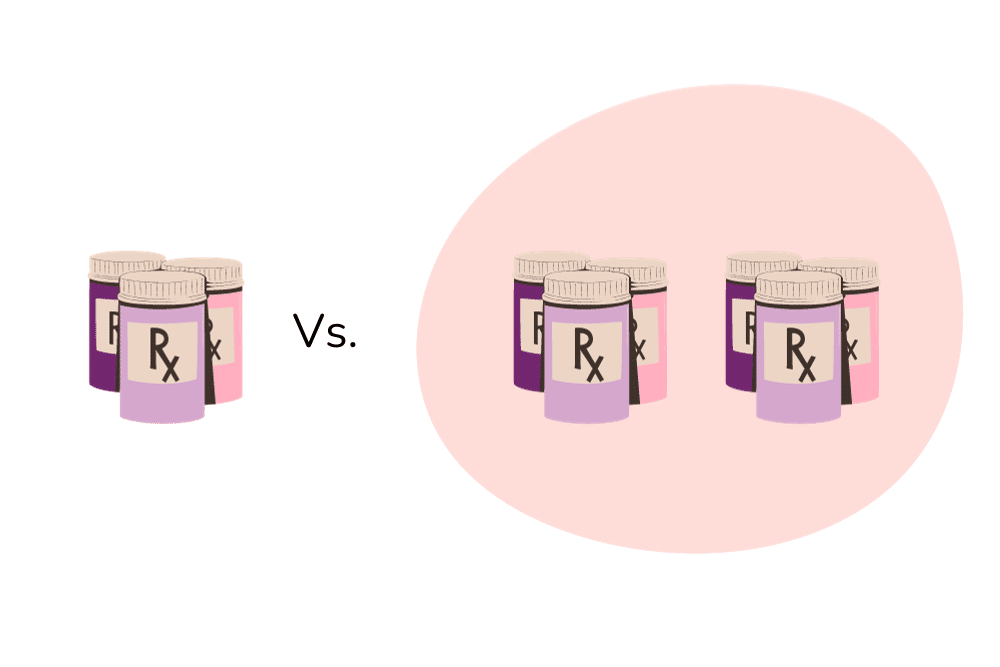People are always looking for innovative ways to make prescription medications more convenient. 60-day dispensing is one such innovation that’s gaining popularity. It’s a patient-centred approach that offers many advantages for managing chronic conditions and ensuring better medication adherence while lessening the load on the health system. But what exactly is 60-day dispensing, and how does it affect healthcare and support patients?
In this article, we explore 60-day prescription medications, what they are, how they work, and how they’re reshaping healthcare. Whether you’re a patient seeking a more convenient way to manage your prescriptions or a healthcare professional looking to optimise patient care, understanding 60-day prescriptions is the key to informed decision-making and improved healthcare outcomes.
What Are 60-Day Prescription Medications?
60-day prescription medications allow eligible patients to receive a two-month supply of their meds with a single prescription. This innovative approach aims to streamline medication management for individuals with ongoing health conditions. As of September 2024, over 300 medicines listed on the Pharmaceutical Benefits Scheme (PBS) in Australia will be eligible for 60-day prescriptions.
To qualify for this extended medication supply, patients must:
Live with an Ongoing Health Condition: These include asthma, cardiovascular disease (heart disease), high blood pressure, depression, endometriosis, heart failure, ulcerative colitis, and more.
View the full list of all the medicines currently available for 60-day prescribing.
Stability Assessment: A healthcare provider must assess the patient’s stability on their current medication regimen to ensure their health condition is well-controlled.
Discussion with the Provider: Patients should discuss their medication needs and the transition to a 60-day supply with their healthcare provider.
New 60-Day Prescription: To get a two-month medication supply, patients will need a new prescription specifically designated for 60-day prescription medications.
The transition to 60-day prescription medications is being phased in over 12 months, with completion expected by September 1, 2024. These changes are based on recommendations from the Pharmaceutical Benefits Advisory Committee (PBAC), which found it safe and suitable to offer 60-day prescriptions for eligible patients. Providers can use their clinical judgement to determine the most appropriate prescription duration based on their patient’s unique healthcare needs.
Monthly Refills vs. 60-Day Prescription Medications
In the past, patients managing chronic health conditions had to deal with monthly prescription refills, leading to frequent trips to the pharmacy and potential disruptions in their medication routine. With the introduction of 60-day prescription medications, patients can now receive a two-month supply of medication with a single prescription, reducing the need for monthly refills.
This shift enhances convenience and optimises medication adherence. Patients are more likely to take their medications regularly when they have a consistent supply on hand. While eligible patients can purchase two months’ worth of medication with a single prescription, the total amount of medication consumed over a year remains the same.
Additionally, the introduction of 60-day prescription medications is carefully monitored to ensure there are no disruptions to medication supply. Most medications recommended for 60-day dispensing by the PBAC have no supply shortages in Australia. Medicine shortages can occur for various reasons, but the phased implementation of 60-day prescriptions minimises disruptions and allows supply chains to adapt.

Benefits for Patients
Patients managing chronic health conditions face various challenges when it comes to their medication regimens. 60-day prescription medications bring several advantages, making them beneficial for those in need.
Improved Medication Adherence: 60-day prescription medications reduce the risk of missed doses, leading to more consistent adherence and potentially improving health outcomes.
Reduced Prescription Refill Hassles: Patients need to refill their prescriptions half as often, saving time and effort, which is especially beneficial for those with mobility issues or busy schedules.
Enhanced Convenience for Chronic Conditions: Managing multiple medications becomes more manageable, reducing the risk of errors and ensuring patients consistently have the medications they need.
Benefits for Healthcare Professionals
Healthcare professionals play a crucial role in the well-being of patients with ongoing health conditions. 60-day prescription medications offer several advantages that can improve patient care.
Streamlined Medication Management: Healthcare professionals have reduced administrative work and fewer opportunities for medication errors. Longer prescription durations make it easier to monitor and adjust treatment plans.
Opportunities for Enhanced Patient Counselling: Longer prescription durations allow for more comprehensive patient counselling, in-depth discussions, patient education, and medication reviews.
Impact on Healthcare Workflows: Healthcare professionals can manage their time more efficiently, reduce prescription errors, and increase patient satisfaction with a more streamlined process.
The Role of Prescription Insurance and Cost Savings
Prescription insurance is a key factor in accessing and affording medications. In the context of 60-day prescription medications, insurance coverage and cost savings are vital.
Insurance Coverage for 60-day prescription medications
Eligibility criteria, co-payments, formulary inclusions, and communication with healthcare providers affect how patients benefit from 60-day prescription medications.
Eligibility Criteria: Insurance companies set specific criteria for 60-day dispensing. These criteria may vary between providers, so patients must check with their insurance company to confirm eligibility.
Co-Payments: Insurance plans often have different co-payment structures for 30-day and 60-day prescriptions. Patients need to understand these distinctions and how they affect their out-of-pocket costs.
Formulary Inclusions: Insurance providers maintain a formulary, which is a list of medications covered by the insurance plan. Patients should confirm that their prescribed medications, including those eligible for 60-day dispensing, are part of their insurance company’s formulary.
Communication with Healthcare Providers: Patients may need to work with their healthcare providers to adjust their prescriptions to align with insurance requirements for 60-day dispensing.
Potential Cost Savings
Patients can save significantly with 60-day prescription medications, reducing healthcare visits, increasing cost efficiency, and promoting savings for eligible patients.
Annual Savings: Patients with a 60-day prescription for PBS medicines can save up to $180 per medication annually for Medicare cardholders without a concession card and approximately $43.80 per medicine for concession cardholders.
Cumulative Savings: Collectively, patients purchasing PBS medicines are projected to save more than $1.6 billion over the next four years through the adoption of 60-day prescriptions.
Reduced Healthcare Visits: Patients who rely exclusively on 60-day prescriptions may halve their doctor and community pharmacy visits to renew and fill their prescriptions. This reduction in healthcare visits frees up millions of GP appointments for other healthcare needs.
Cost Efficiency: For eligible patients who pay the standard $30 general co-payment for their PBS medicines, a 60-day prescription translates to the cost of a 30-day supply, offering a more cost-effective option for cheaper medicines.
Regulatory Considerations
Regulations at state and federal government levels ensure the safety and integrity of prescription medication practices. Compliance with these regulations is essential.
Compliance with State and Federal Regulations: State and federal regulations govern prescription medication practices, with specific rules for community pharmacies, healthcare providers, and prescription duration.
Prescription Medication Safety: Regulations aim to protect patient safety, ensuring proper labelling, dosage instructions, and privacy and security of patient data.
Challenges and Concerns
60-day prescription medications come with challenges and concerns, including medication wastage, potential impact on medication access, and regulatory changes.
Medication Wastage and Expiration: Unused medications and expired prescriptions can be problematic, requiring patient education on medication safety.
Potential Impact on Medication Access: Storage issues, financial constraints, and regulatory changes may affect patient access.

The Future of Medication Management
The future of medication management is poised for transformative changes driven by innovations in dispensing technologies and the evolving healthcare landscape. With a growing emphasis on patient-centred care and technological advancements, medication management is undergoing a revolution.
Innovations in Dispensing Technologies
The advent of advanced dispensing technologies, including automated pill dispensers, smart packaging, and digital medication management apps, is set to streamline how patients take their medications. These innovations provide real-time monitoring, reminders, and data-sharing capabilities, enhancing patient adherence and empowering healthcare providers with valuable insights into patient compliance. Moreover, integrating artificial intelligence and machine learning into medication management systems promises personalised treatment plans and improved medication safety, offering a glimpse into a future where healthcare is increasingly tailored to individual needs.
Evolving Healthcare Landscape
The broader healthcare landscape is undergoing a fundamental shift toward value-based care, with an emphasis on preventive health and telemedicine. Medication management is no exception, as it becomes more integrated with holistic healthcare approaches. The future promises seamless care coordination, where patients can access their medication information, health records, and telehealth services in one unified platform.
Youly is shaping the future of medication management by offering an online platform that connects patients with health professionals and pharmacists.
This integrated healthcare system streamlines medication adherence, enhances patient-provider interaction, and empowers patients with the tools they need for effective medication management. As healthcare moves toward value-based care and telemedicine, Youly is well-positioned to provide a patient-centric, efficient healthcare experience.







